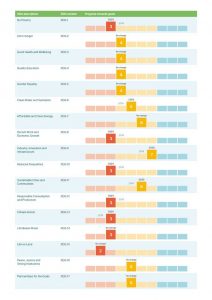M&G’s latest SDG Reckoning report reveals the world is behind schedule on achieving the UN Sustainable Development goals, and must ‘build back better’ in the wake of COVID-19.
M&G Investments’ latest SDG Reckoning report finds that the world is on track to deliver only six of the 17 United Nations Sustainable Development Goals (UN SDGs). Launched in 2015, the UN SDGs are a global call to action to end poverty, protect the planet and ensure all people enjoy peace and prosperity by 2030. M&G analysis shows that progress across nearly 65% of SDGs is lagging, with “no time to waste” on achieving a more inclusive society, one that protects nature and thrives off a circular, regenerative economy.
M&G’s second SDG Reckoning report has assessed all 17 SDGs – from a general perspective and through an impact investing lens – using a scale of 1 to 10 to assess progress since last year’s inaugural rankings, determining whether the world has started to follow through on its pandemic-related sustainable recovery pledges. This year’s report not only zeroes in on goals that most urgently need investment, but also suggests what form that investment could take, and how active investors can support and amplify action across sectors.
The report’s five main findings are:
- An average 2020 progress score of 4.1 out of 10 across all 17 goals, unchanged from 2019, with nine SDGs seeing no change since last year’s report
- Four goals see a notable deterioration, three of which are socially-focused goals – SDG 1 (No Poverty), SDG 8 (Decent Work and Economic Growth) and SDG 10 (Reduced Inequalities)
- Four goals see an improvement – some progress has been made across SDG 6 (Clean Water and Sanitation), SDG 9 (Industry, Innovation and Infrastructure), SDG 11 (Sustainable Cities and Communities) and SDG 13 (Climate Action).
- Despite marginal improvements, SDG 13 (Climate Action) scores only 3 out of 10 on M&G’s progress scale. Landmark events such as the COP26 climate talks taking place this November are a crucial test of how effectively partnerships for sustainable development are functioning.
- Progress across SDG 14 (Life Below Water) and SDG 15 (Life on Land) – two goals that relate directly to tackling biodiversity loss – is worryingly slow. With the COP15 biodiversity summit coming up, policymakers must take an iterative approach to setting stretching but achievable short-term targets on biodiversity.
Ben Constable-Maxwell, Head of Impact Investing, says: “Delivering on the SDGs is a collective responsibility – with governments, businesses, non-governmental organisations, investors and individuals all playing a role. Urgent and collaborative action will be required to deliver necessary progress in key areas – a daunting challenge, but not an impossible one. In terms of timing, however, there is no time to waste – we must act now.”
“Our analysis shows that there is still much work to be done globally in delivering on the UN’s 17 goals. This collective effort is needed across the SDGs’ societal mandate, but especially in areas such as poverty alleviation, decent work and better education, which have fallen behind during the pandemic. Sustainable investing has a crucial role to play in channelling investment towards ‘high societal benefit’ companies. Going one step further, impact investing can lead the way by financing early stage or less developed solutions to the world’s major challenges and by precipitating improvements in measurement and accounting for non-financial outcomes. We need to ramp up the pressure, both on companies to report their real-world impacts and on investors to adopt impact-oriented approaches.”
The report pinpoints three fundamental and highly interconnected themes that M&G believe warrant further attention and investment. Greater efforts are needed to promote social inclusion, with the COVID-19 crisis having plunged millions of people into poverty. The report also flags an urgent need to shift to a circular global economy, moving away from the current wasteful and linear model. At the same time, the spotlight on biodiversity has intensified over the last 12 months – with the world waking up to the stark reality of nature and habitat loss, and the repercussions this has on the ecosystems that provide the foundations for human wellbeing and a stable climate.

















